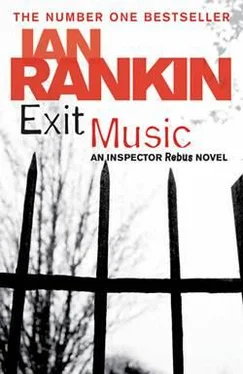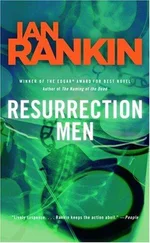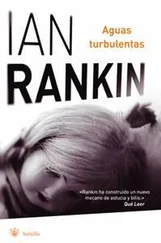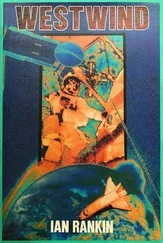'First time I listened,' Clarke said, 'I noticed he performed some poems in English, some in Russian.'
Colwell nodded. 'The new poem was in Russian. Ah, here it is.'
She trotted back to her desk and brought out a pad of paper and a pen, concentrating hard as she started to write. Eventually, she told Clarke to press 'rewind'. They listened again, Clarke hitting 'pause' when she felt Colwell was falling behind. 'I really need more time,' the academic apologised. 'This isn't the ideal way to translate a poem…'
'Call it a work in progress,' Clarke cajoled her. Colwell pushed a hand through her mane of hair and started again. After twenty minutes, she tossed the pen back on to the desk. On the CD, Todorov was using English to tell the audience that the next poem was from Astapovo Blues.
'He didn't say anything about the new work,' Clarke realised.
'Nothing,' Colwell agreed.
'Didn't introduce it, either.'
Colwell shook her head, then pushed her hair back into place again. 'I'm not sure how many people would have realised it was a new piece.'
'How can you be sure it was new?'
'There don't seem to be any drafts in his flat, and I know his published work rather well.'
Clarke nodded her understanding and held her hand out. 'May I?' The academic seemed reluctant, but eventually handed the pad over. 'It's really very rough… I've no idea where the line breaks would go…'
Clarke ignored her and started reading.
Winter's tongue licks the children of Zhdanov… The Devil's tongue licks Mother Russia, coating tastebuds with precious metals.
Heartless appetite… The gut's greed knows no fullness, no still moment, no love. Desire ripens, but only to blight. There are morsels here for all in the heat of famine, penances for all as the winter's shadow falls… such a package of scoundrels in my country.
Clarke read it through twice more, then met Colwell's eyes. 'It's not very good, is it?'
'It's a bit rough at the edges,' the academic said defensively.
'I don't mean your translation,' Clarke assured her.
Colwell nodded eventually. 'But there's an anger to it.'
Clarke remembered Professor Gates's words at the Todorov autopsy – there's a fury here. Tes,' she agreed. 'And all that imagery of food…'
Colwell cottoned on. 'The news story? But surely that appeared after Alexander died?'
“True, but the dinner itself was a few days earlier – maybe he'd found out about it.'
'So you're saying this is a poem about the businessman?'
'Composed on the spot, just to get up his nose. Andropov made his fortune from those “precious metals” Todorov mentions.'
'Making him the Devil?'
“ioM don't sound wholly convinced.'
The translation is rough… I'm guessing at some of the phrases.
I really need more time with it.'
Clarke nodded slowly, then remembered something. 'Can I try another CD with you?' She found what she was looking for in her Ibag and knelt down next to the hi-fi. Again, it took a little while Ito find the moment when, at the Word Power reading, Charles [Riordan's roving mic picked up the Russian voice.
'There,' Clarke said.
'It's only a couple of words,' Colwell said. 'He's answering a phone call. All he says is “hello” and “yes”.'
'Worth a try,' Clarke said with a sigh, ejecting the disc and rising to her feet. She reached for the pad of paper again. 'Can I take the poem with me meantime? Leave you to get on with something you feel is more accurate?'
'There was bad blood between Alexander and this businessman?'
'I'm not sure.'
'But it's a motive, right? And if they met again in that bar…'
Clarke held up a hand in warning. 'We've no evidence that they even saw one another in that bar, which is why I'd be grateful if you kept all of this to yourself, Dr Colwell. Otherwise you could jeopardise the inquiry.'
'I understand.' The academic nodded her agreement. Clarke tore the sheet from the pad and folded it into four.
'One little piece of advice,' Clarke said as she finished folding.
'The final line of the poem, he's quoting from Robert Burns. It's not “a package of scoundrels”… it's “a parcel of rogues”…'
Rebus sat by the bedside of Morris Gerald Cafferty.
He'd shown his warrant card and asked the day shift if Cafferty had had any other visitors. The nurse had shaken her head.
No, because – despite his goading of Rebus – Cafferty had no friends. His wife was dead, his son murdered years back. His trusted lieutenant of long standing had 'disappeared' after a falling-out.
There was just the one bodyguard at the house, and right now his main concern was probably where his next paycheque was coming from. Doubtless there would be accountants and lawyers – Stone would have the details – but these weren't the sort of men to pay respects. Cafferty was still in intensive care, but Rebus had heard two staff members discussing a looming bed crisis. Maybe they would move him back to an open Ward. Or, if his finances could be unlocked, a private room. As of now, he seemed content with the tubes, machines, and flickering screens. There were wires attached to his skull, measuring brain activity. Fluids were being drip-fed into one arm. Cafferty seemed to be wearing some sort of gown with a front but, Rebus guessed, no back. His arms were bare and the hairs covering them were like silver wires. Rebus stood up and leaned down over Cafferty's face, wondering if the machine might suddenly register awareness of his proximity, but there was no change in the readout. He traced the route from Cafferty's body to the machines and from there to the wall sockets. Cafferty wasn't dying; the doctor had confided that much. Another reason to move him from intensive care. How intensively did you have to tend a vegetable? Rebus looked at Cafferty's knuckles and fingernails, the thick wrists, the dry white skin on each elbow. He was a large man, yes, but not particularly muscular. There were lines around
the neck, like the circles on a freshly felled tree. The jaw was slack, the mouth open to accommodate a tube. There was a single track down the side of the face where some saliva had dried to a crust.
With eyes closed, Cafferty looked harmless enough. What little hair there was on his scalp needed a wash. The charts at the end of the bed had told Rebus nothing. They were just a way of reducing the patient's life to a series of numbers and graphs. Impossible to tell if a line angling upwards was a good sign or a bad…
'Wake up, you old bastard,' Rebus whispered into the gangster's ear. 'Playtime's over.' Not a nicker. 'No point you hiding there inside that thick skull of yours. I'm waiting for you out here.'
Nothing apart from a gurgling in the throat, and Cafferty was making that same sound every thirty seconds or so. Rebus slumped back into his chair. When he'd arrived, a nurse had asked if he was the patient's brother.
'Does it matter?' he'd asked her.
'It's just that you do look like him,' she'd said, waddling away.
He decided that it was a story worth sharing with the patient, but before he could start there was a trembling in his shirt pocket.
He took his mobile out, checking to left and right for anyone who might disapprove.
'What's up, Shiv?' he asked.
'Andropov and his driver were in the audience at the Poetry Library. Todorov made up a poem on the spot, and I think Andropov was its target.'
'Interesting.'
'Have they given you a break?'
It took a moment for Rebus to realise what she meant. 'I'm not being grilled. Nothing on the overshoe but blood – same type as Cafferty.'
'So where are you now?'
'Visiting the patient.'
'Christ, John, how's that going to look?'
'I wasn't planning on sticking a pillow over his face.'
Читать дальше












